#m myriel
Text
Les Misérables - Part 1 (Fantine), Chapter 1 (An Upright Man / Un Juste), Section 1 (M. Myriel)
Although it in no manner concerns, even in the remotest degree, what we have to relate, it may not be useless, were it only for the sake of exactlness in all things, to notice here…
Ah, the fundamental literary philosophy of Les Misérables! :P
The background of M. Myriel is one that you would expect to produce a reactionary. His family was prosperous (though not aristocratic), he had a life “devoted to the world and its pleasures,” his family were driven into exile by the Revolution and likely some were killed, his wife died, and he returned to France in his later years as a priest. (Having him become a priest outside of France and old return during Napoleon’s rule is also a convenient way for Hugo to have an elderly bishop without needing to bring in the question of whether or not he swore the oath in support of the Civil Constitution of the Clergy during the Revolutionary era.) The nature of his past is, I think, intended to make his actions and attitudes detailed in the rest of the chapter more unexpected for the reader.
Based on his age at the start of the book, M. Myriel was in his middle age - nearly fifty - when the Revolution began, and in his 60s when he first returned to France.
I feel like there is great significance in M. Myriel’s line to Napoleon - “Sire, vous regardez un bonhomme, et moi je regarde un grand homme. Le deux peux profiter.” [You regard a goodman, and I a great man. Both may benefit.] - but that I don’t understand all the nuances and connotation of the word ‘bonhomme’ that are needed to interpret it. My book translates it as ‘goodman’ in Napoleon’s preceding question (“Who is this goodman who looks at me?”) and ‘good man’ in Myriel’s reply.
I think there’s a deliberate contrasting of the “good man” who M. Myriel is and “great man” that Napoleon is, and possibly an implicit question followed up in the rest of the book about whether France should strive to be “good” or “great” , which is reflected in its ambivalent attitude towards Napoleon.
It’s also a gutsy thing for a mere curé to say to the Emperor of France (the implication is that Napoleon is a great man but not a good one), and shows that despite the quiet life Myriel has led since his return to France, he doesn’t lack for courage or boldness.
And in this particular case, Napoleon’s response - giving Myriel a large promotion but not an easy one, one where he will be responsible for a poor district facing many challenges, with the implication that Napoleon thinks he has the will and the strength to do a good job of it - is one that shows him in a positive light.
The use of the word palabres to mean gossip or meaningless talk must be part of the etymology of the English ‘palaver’; I like finding those connections!
44 notes
·
View notes
Text
A beautiful day today, as we meet the best bishop to ever walk this Earth. I have to admit, Hugo does not make entrance into Les Mis easy for newcomers. The amount of times I picked the Brick up and stopped within the first chapter is, a little embarrassing.
But though the third sentence quite literally begins: “Although this detail has no connection whatever with the real substance of what we are about to relate, it will not be superfluous, if merely for the sake of exactness in all points, to mention here the various rumors and remarks which had been in circulation about him from the very moment when he arrived in the diocese,” I’m glad he put this little tangent. It almost perfectly encapsulates the way Hugo will set the Bishop apart and at odds with most of the world. It also is our first glimpse into the general population, the way Victor Hugo sees people in positions of power, and, critically, the ever present impact of the French Revolution.
(Also M Myriel is the best ever and I would die for him <3)
30 notes
·
View notes
Text
love guillotine as a symbol, every man sees in it what he wants, and when bishop sees it as something that doesn't let your remain neutral, it is the reflection of his own thoughts on whether he'll have to act on his beliefs in future
"The guillotine is the concretion of the law; it is called vindicate; it is not neutral, and it does not permit you to remain neutral".
M.Myriel also starts thinking that if we, as a society invented machine to do God's work, that is, decide who lives and dies, haven't we gone too far? Isn't it time for a change?
"The scaffold is the accomplice of the executioner; it devours, it eats flesh, it drinks blood; the scaffold is a sort of monster fabricated by the judge and the carpenter, a spectre which seems to live with a horrible vitality composed of all the death which it has inflicted."
“I did not think that it was so monstrous. It is wrong to become absorbed in the divine law to such a degree as not to perceive human law. Death belongs to God alone. By what right do men touch that unknown thing?”
50 notes
·
View notes
Text
I really want to have thoughts on today’s chapter, but I admittedly got a bit lost during the senator’s rant. There’s definitely a something about how people justify self-serving behavior in there – while a lot of it is framed in religious language to contrast him with the bishop, I think “One must eat or be eaten. I shall eat” is a more concise summary of his philosophy – but I also think there’s something inherently performative about him? The philosophy books “gilded on the edges” that he keeps in his library seem to not only be a display of wealth, but a sign of what he himself his like. He justifies himself with references to these philosophers (or refutations of them), but his argument isn’t very substantial, it’s just dramatic?
I don’t know, I think I could have missed a greater point there (I don’t think he’s supposed to be sympathetic, but I have to admit that I zoned out the instant I saw that giant paragraph and couldn’t concentrate for his smaller bits of dialogue because I laughed every time he said “egad”.).
What I did like seeing is how easily Myriel understood and encouraged him. Even if he now stands in contrast to this senator, his ability to speak to him so easily really underscores how he was once just like him. His encouragement of him (“good devils, even”) seems to be in genuine good humor (and is also funny to hear from a priest), but it highlights his skill in dealing with members of his own former class in addition to the villagers he usually works with.
spoilers below:
Honestly, my main feeling after reading this chapter is dread for when Grantaire appears. I saw that long rant without any paragraph breaks and suddenly realized that I’ll be getting so much more of those once he shows up. The content seemed similar, too (although I could be misremembering): Grantaire’s commitment to not believe in anything would prevent him from labeling himself as an Epicurean, I imagine, but that kind of pessimistic attitude towards goodness and/or an afterlife? That feels very in line with his character as I remember it. I really do love the Amis section of the novel, but those rants will be rough.
#les mis letters#m myriel#monseigneur bienvenu#les miserables#1.1.8#the bishop of digne#When characters in les mis rant#It feels like a digression within a digression
26 notes
·
View notes
Text
V glad I’m not going into the Brick unspoiled. Would be sad to learn that Bishop Awesome isn’t the main character if I didn’t know that from the start
#les mis letters#m myriel#my blorbo#my cinnamon roll#my object lesson in the hard truth that even the most exaggeratedly perfect individual working within the system isn’t enough#to make a difference on more than an individual level
11 notes
·
View notes
Text
although im reading the book at my own pace and not following along with the les mis letters its still very fun to see everyone real hyped over bishop myriel
#les mis#m myriel#bishop myriel#monseigneur bienvenu#this dude has too many titles#anyways#he is cool as fuck ill give you guys that much#i just did not expect to go under the les mis tag and find everyone obsessing over him
2 notes
·
View notes
Text
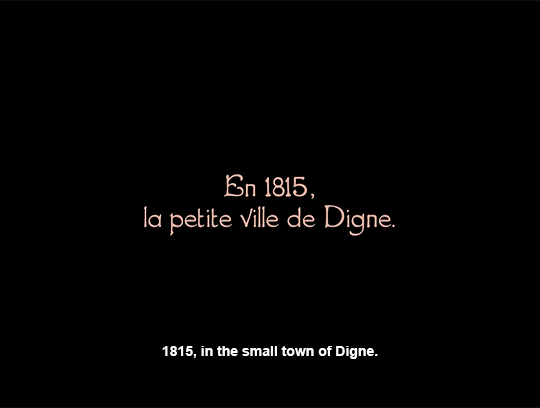


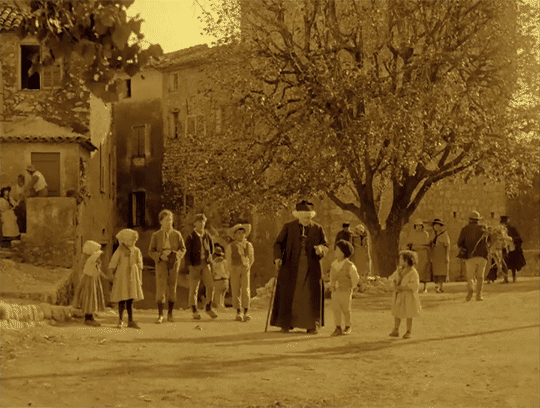

LES MIS LETTERS IN ADAPTATION -M. Myriel, LM 1.1.1 (Les Miserables 1925)
In 1815, M. Charles-François-Bienvenu Myriel was Bishop of D——
#Les Mis#Les Miserables#Les Mis Letters#Les Mis Letters in Adaptation#M. Myriel#Bishop Myriel#Myriel#Les Mis 1925#Les Miserables 1925#pureanonedits#lesmisedit#lesmiserablesedit#lesmis1925edit#lesmiserables1925edit#Hey...hey there's seven children in the first gif.#Oh Noooo I bet you anything that was intentional.
100 notes
·
View notes
Text
Favorite change in Les Mis adaptations is Bishop Myriels reply to Jean Valjean.
Jean when shown to his room asks The Bishop:
JVJ: "How do you know I won't murder you?"
Bishop: "How do you know I won't murder you."
In the book The Bishop's reply is something like, "That is the concern of the good God". But the dialogue change to a fun, and whitty line really summarizes who Myriel is as a person in the novel; he's funny, down to earth, and just overall very generous and kind.
#i loved reading M. Myriels chapters#im also rewatching older les mis movies and am having a blast !#please tell me your favorite les mis adaptation im curious#the bishop#les miserables#jean valjean#iovitapost#op
24 notes
·
View notes
Text
reading the brick fully for the first time and the priest is so funny? like genuinely making me chuckle. i love him
22 notes
·
View notes
Text
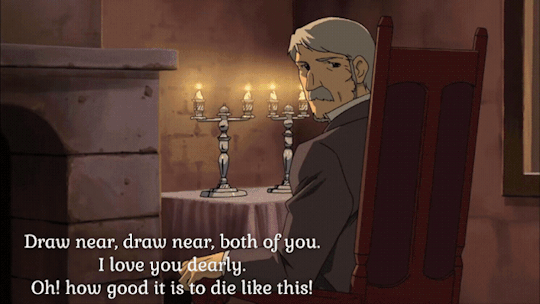
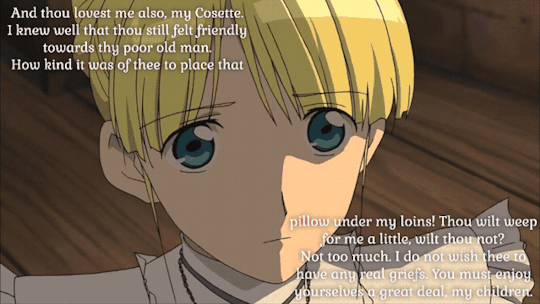
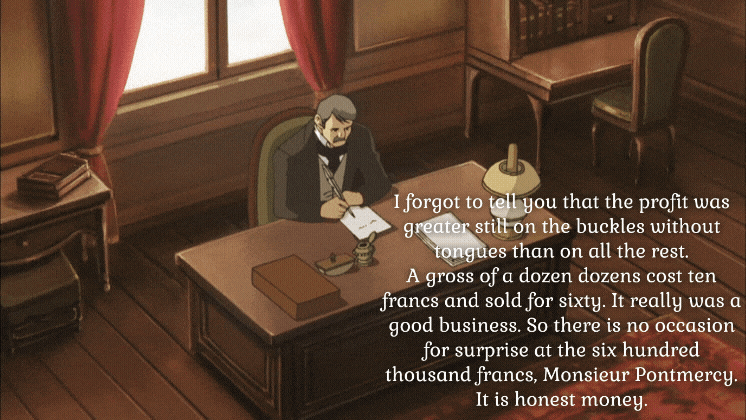






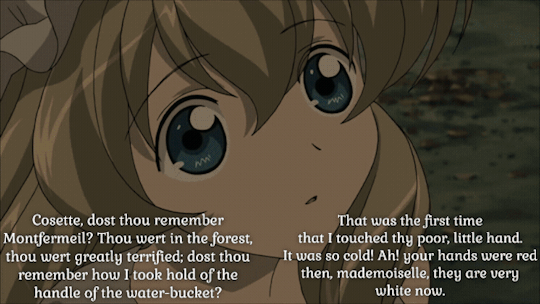
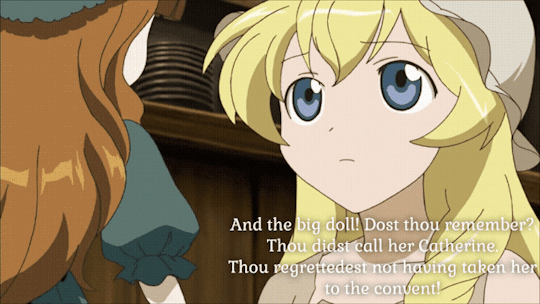

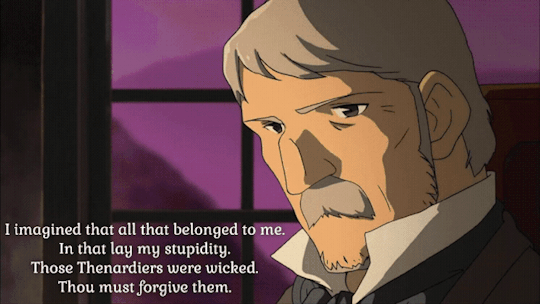


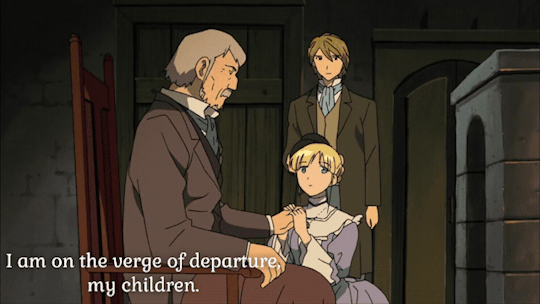


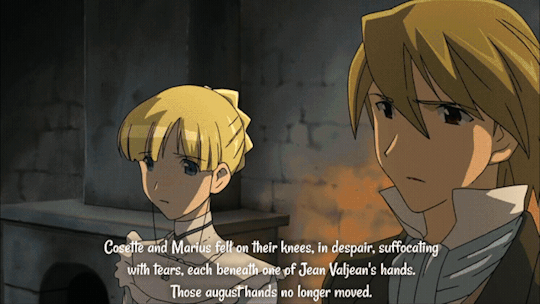
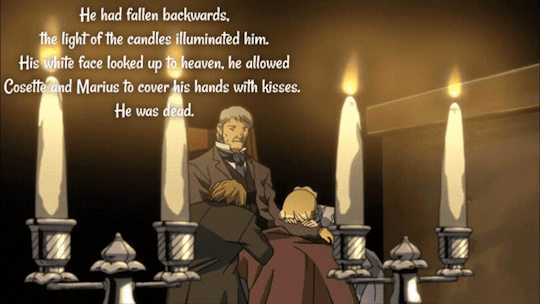
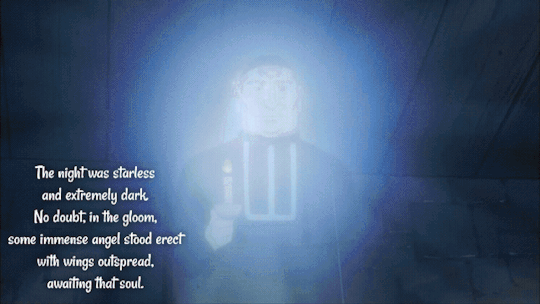
The Last Moment of Valjean, Volume 5, Book 9, Chapter 5.
Clips from <Il cuore di Cosette>.
#Les miserables#les mis#My Post#Jean Valjean#Cosette#Father and daughter#Owl and Wren#Marius#Lark and Booby#M. Madeleine#The Silver Candlesticks#Bishop Myriel#Little Mlle. Lanoire#Poor Lark#The Dark Forest#When Two Anxious Hearts First Met#Fantine#Lady all in White#Angel and Lark#Poor Mother...#Sister Simplice#Fantine's Death#They had a child!#Valjean's Death#Finally this moment has come.#The journey of a convict who turned into a saint.#It's such a Nice Thing that Tumblr allowed more than 10 images so I can write the entire quote of Valjean's last words into a single post!#Also I love this adaptation since they used the Bishop and Fantine as two angels instead of Eponine like in the 2012 film#The Brick#Il cuore di Cosette
16 notes
·
View notes
Text
Madame Magloire had once remarked, with a sort of gentle malice: “Monseigneur, you who turn everything to account, have, nevertheless, one useless plot. It would be better to grow salads there than bouquets.” “Madame Magloire,” retorted the Bishop, “you are mistaken. The beautiful is as useful as the useful.” He added after a pause, “More so, perhaps.”
I just really like this line.
26 notes
·
View notes
Text
#les mis#les miserables#Poll#jean valjean#fantine#Cosette#eponine#marius pontmercy#javert#enjolras#les amis#monsieur thenardier#madame thenardier#patron minette#bishop myriel#the brick#les mis letters#I don’t think I’m missing any one major but if so I’m very sorry#this book just got too many people in it idk what else to say man
339 notes
·
View notes
Text
The description of the silver reminded me today of something really poignant about M. Myriel. He’s the saintliest man possible, gives away everything to the poor and needy and keeps only silver tableware in terms of luxuries. And yet he was once, essentially, a handsome fop at the beginning of his life who cared only for himself.
It’s just how Hugo paints this large circle of redemption and how redemption does not make the good acts of someone any lesser, in some ways is more compelling than total perfection. M. Myriel redeems himself then in his kindness allows Jean Valjean to be redeemed, who then saves Cosette and Marius and Fantine, all these characters who give kindness to others in return. And it creates this huge web of giving and caring and kindness and it’s kind of awe inspiring really that it all began with one man (if it began with him at all).
92 notes
·
View notes
Text
M.Myriel points to the fact that the philosophies of the ruling classes lack depth and at the same time cater to them, viewing poor as devoid of sense. If the basis of the philosophy is greed, where is the depth in it, what is the spiritual purpose of that philosophy?
"You great lords have, so you say, a philosophy of your own, and for yourselves, which is exquisite, refined, accessible to the rich alone, good for all sauces, and which seasons the voluptuousness of life admirably. This philosophy has been extracted from the depths, and unearthed by special seekers. But you are good-natured princes, and you do not think it a bad thing that belief in the good God should constitute the philosophy of the people, very much as the goose stuffed with chestnuts is the truffled turkey of the poor.”
#les mis letter#les mis letters#m.myriel#m myriel#les miserables#les mis#victor hugo#viktor hugo#literature#art#quote#quotes#analysis
11 notes
·
View notes
Text
let's settle this once and for all
perhaps reblog and tell me who you voted for :]
147 notes
·
View notes
Text
In 1815, M. Charles-François-Bienvenu Myriel was Bishop of

#this is my way of announcing that i'm doing a full les mis letters catch up from square one#(it's the only way my autistic brain will let me catch up on days i missed bc it still has to all be in order ofc)#so don't mind me over here making memes like three months too late 🤪🫶🏻#les mis#les mis letters#lm letters#lm 1.1.1#bishop myriel#the censorship is so funny to me so here#mine
116 notes
·
View notes